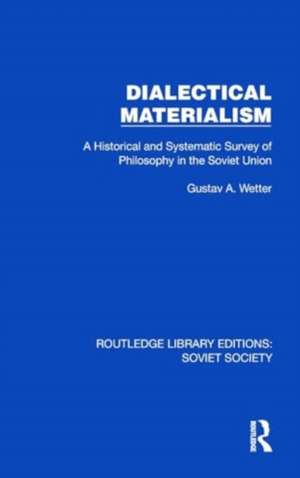Dialectical Materialism: A Historical and Systematic Survey of Philosophy in the Soviet Union: Routledge Library Editions: Soviet Society
Autor Gustav A. Wetteren Limba Engleză Hardback – 26 noi 2024
Preț: 1138.99 lei
Preț vechi: 1389.01 lei
-18% Nou
Puncte Express: 1708
Preț estimativ în valută:
217.97€ • 236.69$ • 183.10£
217.97€ • 236.69$ • 183.10£
Carte tipărită la comandă
Livrare economică 23 aprilie-07 mai
Preluare comenzi: 021 569.72.76
Specificații
ISBN-13: 9781032862859
ISBN-10: 1032862858
Pagini: 624
Dimensiuni: 156 x 234 mm
Greutate: 1.31 kg
Ediția:1
Editura: Taylor & Francis
Colecția Routledge
Seria Routledge Library Editions: Soviet Society
Locul publicării:Oxford, United Kingdom
ISBN-10: 1032862858
Pagini: 624
Dimensiuni: 156 x 234 mm
Greutate: 1.31 kg
Ediția:1
Editura: Taylor & Francis
Colecția Routledge
Seria Routledge Library Editions: Soviet Society
Locul publicării:Oxford, United Kingdom
Public țintă
Academic, Adult education, General, Postgraduate, Undergraduate Advanced, and Undergraduate CoreCuprins
1. The Philosophical Roots of Marxism 2. Karl Marx and Friedrich Engels 3. Revolutionary Movements in Russia: the Origins 4. Philosophical Tendencies in Russian Marxism before the Revolution 5. Vladimir Ilyich Lenin 6. Philosophical Developments in the USSR up to 1931 7. Mechanism 8. Menshevik Idealism 9. Developments since 1931 10. Stalin as a Philosopher 11. Since the Death of Stalin 12. Conception of Philosophy 13. The Theory of Matter 14. The Materialist Dialectic 15. The Theory of Categories 16. Dialectical Materialism and Modern Science 17. The Dialectical Materialist Theory of Knowledge 18. Logic
Notă biografică
Gustav A. Wetter was a Jesuit father and a professor at the Papal Oriental Institute in Rome. He enjoyed a worldwide reputation as a leading authority in his field, whose learning and impartiality met with reluctant commendation even from avowed political opponents.
Descriere
Dialectical Materialism (1958) surveys the history of dialectical materialism from its Hegelian beginnings to the death of Stalin, and its sequel in the celebrated XXth Party Congress of the C.P.S.U. It also presents a systematic account of the theory as it was formulated and discussed by the philosophers of the Soviet Union.













